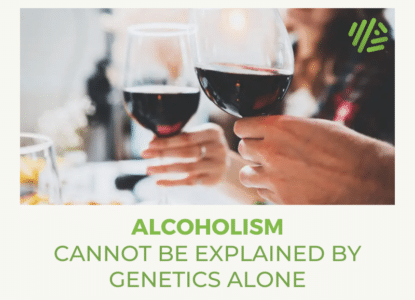The CLOCK Genes: How Our Genes Impact Sleep

Contents
In most species, from bacteria to humans, endogenous (internal) clocks have evolved that drive 24-hour rhythms of behavior and physiology. Sleep is an active state of unconsciousness where the brain is primarily responsive to internal stimuli. It is an extremely complex process that is driven by the interaction between two largely independent basic mechanisms 1:
- The circadian rhythm
- The homeostatic drive to sleep.
See also: Oura Ring vs. Whoop Strap: Which Sleep Tracker is Best
Researchers still don’t know why we need sleep!
Although it may seem obvious, the exact purpose of sleep has not yet fully been determined. Numerous theories have been put forward after years of research 2:
- Inactivity theory – This theory is based on evolutionary pressure and suggests that creatures being inactive at night were less likely to die from the predation of injury in the dark.
- Energy conservation theory – This theory states that sleep reduces the energy demand during part of the day and night when it is least efficient to hunt for food and is supported by the fact that the body’s metabolism decreases by up to 10% during sleep.
- Restoration theory – This theory suggests that sleep allows for the body to repair and replete cellular components necessary for biological functions. This is also supported by the fact that several hormones are secreted during sleep.
- Brain plasticity theory – This theory is based on the notion that neural reorganization and growth of the brain’s structure and function occur during sleep.
An agreement as to which theory is correct has not yet been reached, however, a combination of these theories likely explains why humans cannot function without sleep.
Sleep and how much you sleep is controlled by your genes
Interestingly, research has shown that changes in gene expression occur during sleep and wakefulness cycles. Extended wakefulness causes increased energy expenditure in the brain so, in an effort to limit this, multiple mechanisms are activated to reduce the duration of wakefulness. Research has found that ‘sleepiness’ begins when the expression of certain genes is increased to a point where metabolites, such as adenosine, accumulate, which is usually at the end of the day 3.
Clock genes
The main genes that are responsible for precisely- timed circadian rhythms in every cell of our bodies are:
- BMAL1
- PER1, PER2 and PER3
- CRY1 AND CRY2
- CLOCK
Clock genes seem to play an essential role in the communication of different brain regions and circuits and complex neuropsychiatric processes like learning, development, and aging.
Studies have shown that deactivating the CLOCK and BMAL1 genes decreases total sleep time in animal models and that the C allele of the CLOCK gene is linked to grogginess and being more sleepy during the day, whereas people with the T allele are more likely to be morning people and have less total sleep duration9.
Genetic variations in the BMAL1 gene have been associated with insomnia and early awakening among middle-aged women10.
So, whether you are a “night owl” or “morning lark”, it’s actually a factor of your genetic expression!
CLOCK genes and sleep deprivation
Several rodent studies have demonstrated the impact of sleep deprivation on the clock genes Per1 and Per2. They found that 6 h of deprivation at the start of animals’ rest phase increases the expression of these genes in the forebrain and midbrain structures. They found that Per2 specifically, increased in the brain, liver, and kidney following sleep deprivation4.
The research concluded that Per2 levels not only contain information about the time of day but also keep track of the time spent awake.
A study in 15 young healthy males found that a full night of sleep deprivation reduced the expression of BMAL1, CRY1, and PER2 in white blood cells and skeletal muscle5 and shows that a lack of sleep can be sensed in multiple organ systems or processes.
The study also looked at cortisol and blood glucose levels with sleep loss. They found that one night of sleep deprivation changed the genetic landscape of fat and muscle tissue. This demonstrates a direct link to increased risk factors of obesity, type 2 diabetes, and cardiovascular disease if there is a continuous lack of sleep.
Genetic variations in the Clock genes
Since a lack of sleep has been associated with several chronic illnesses, researchers have decided to look at whether any genetic variations in clock genes are associated with the development of these health conditions. Interestingly, a higher risk of obesity, metabolic alterations, and type 2 diabetes has been found in shift workers and provides further evidence to support the link between disrupted sleep patterns and disease.
Obesity
Interestingly, eight common variants of the CLOCK gene have been associated with obesity. Sleep disturbances can alter brain functions involved in the control of appetite, which can generate overeating, and when combined with one of these variations, can predispose a person to obesity5,6.
In a study that looked at five hundred overweight/obese subjects aged 20-65 years, they wanted to determine whether the success of obesity therapy (weight loss) was dependent on the variation of the CLOCK gene that they possessed7.
They reported some interesting results:
- Patients with the variant G allele lost significantly less weight compared to patients without the variant.
- Weight loss over time was significantly different in patients that carried different variations of the CLOCK gene.
- Carriers of the G allele variant displayed greater difficulty in losing weight than non-carriers.
- The frequency of short-time sleepers (< or =6 h per day) was greater in the G allele carriers than in non-carriers
So, in a nutshell, if you carry this allele, you may have a shorter sleep duration than non-carriers, which may predispose you to become overweight.
Type 2 diabetes (T2D)
The CLOCK gene, in addition to its sleep-regulating activities, was also found to regulate glucose metabolism in rodent models. Cross-sectional studies in humans have reported associations between certain gene variations and obesity, plasma glucose, hypertension, and T2D prevalence, supporting a role for these variations in increasing cardiovascular disease risk.
One study analyzed the association between the CLOCK G allele and incidence of T2D in 7098 participants in a 4.8-year follow-up study8. They found that G allele carriers presented lower T2D risk than CC (less dominant) carriers.
They also found that when these patients were introduced to the Mediterranean diet, the G allele carriers were protected from T2D.
The Bottom Line
Sleeping from 7 to 8 hours per night is considered optimal for health, since both shorter and longer sleep have been related to poor health outcomes, including obesity, heart disease, neuroticism, anxiety, and even death.
Sleep or lack of sleep affects our “clock genes.” As mentioned previously, these genes are linked to important health factors like the immune system, stress, and chronic disease.
Studies now confirm that even one night of sleep deprivation can impact your genetic profile by altering the expression of your genes.
So, taken together, your behavioral and physiological functions are determined by the amount of sleep you get each night.



